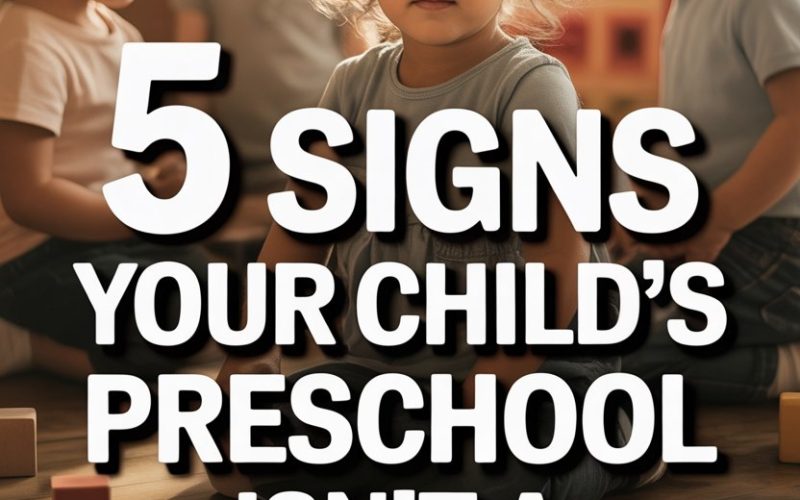Preschool should feel like a second home. You’re handing your little whirlwind off each morning, trusting someone to keep them safe, happy, and (fingers crossed) a bit more civilized by pickup.
But what happens when things don’t feel quite right? Here’s what to watch for—and what you can do before you start googling ‘how to homeschool in my region.’
1. Your Child’s Moods Have Gone Haywire
Everyone has an off day, even the best of us. But if your usually sunny kiddo transforms into a pint-sized storm cloud every afternoon, it’s time to pay attention.
Frequent tantrums, unusual clinginess, or a sudden reluctance to go to preschool can be subtle (or not-so-subtle) red flags.
Keep an eye out for changes like nightmares, disrupted sleep, or a total loss of appetite for their previously beloved dinosaur-shaped nuggets.
Children aren’t always masters of communication—sometimes all you get is a wobbly lip and a refusal to put on their coat. Don’t dismiss it as ‘just a phase.’
If the mood swings persist for more than a couple of weeks, dig deeper. Start with a gentle chat during bath time or story hour. Avoid the Spanish Inquisition routine; instead, ask open-ended questions.
Sometimes, little ones will spill all after a few minutes of building blocks or colouring together.
If you’re still unsure, trust your instincts. The National Association for the Education of Young Children has pointed out that consistent emotional shifts can be a clue that something isn’t right at school.
Never underestimate your parental spidey-sense.
2. Communication with Staff Feels Like a Game of Telephone
You want to know if your child had a good day, made a new friend, or perhaps attempted to scale the bookshelf (again). Reliable, open communication with teachers and staff is crucial.
If you’re getting only generic updates—“Today was fine!”—or worse, no feedback at all, there’s a problem.
Ever tried to get specifics and been met with vague answers or, even better, defensiveness? A top-quality preschool welcomes questions and concerns.
You should feel confident that staff know your child as an individual, not just as “another four-year-old with a snotty nose.”
When updates are scarce or you sense a reluctance to discuss your child’s experience, it may signal understaffing, poor training, or a culture that doesn’t value parent involvement.
Research from Zero to Three highlights how strong school-home partnerships lead to happier, more secure children. If communication feels like pulling teeth, consider it a flashing neon sign.
3. The Classroom Environment Doesn’t Feel Safe or Welcoming
Ever walked into a room and felt that prickly “get me out of here” feeling? Children are no different.
A well-run preschool should look a bit like organised chaos: kids giggling, art drying on the walls, blocks everywhere, and staff watching over the hubbub with the calm of seasoned zookeepers.
If the classroom feels sterile, chaotic, or worse—unsafe—it’s time to take notice.
Broken toys, dirty bathrooms, or sad, forgotten lunchboxes lurking under tables? Not a great sign. Safety goes beyond cleanliness. Are the teachers alert? Do they seem to genuinely care, or are they buried in their phones while the kids run riot?
Pay attention to how your child interacts with the space. Do they seem excited to show you their artwork or new favourite corner? Or do they shrink away and stick to your leg like a barnacle?
Your child’s comfort in their classroom is a direct reflection of the environment and the energy of the adults running it.
Studies from the Harvard Center on the Developing Child have shown that positive, responsive relationships with educators are essential for emotional safety and development.
If your child’s classroom feels more haunted house than happy haven, it’s worth asking some tough questions.
4. You’re Noticing Behaviour Issues—And No One Seems to Care
Every child experiments with rules. One day they’re little angels sharing snacks, the next they’re channeling their inner Godzilla.
Good preschools expect this and have strategies in place—think redirection, gentle reminders, or a quiet cuddle on the reading mat.
When staff seem overwhelmed, uninterested, or overly punitive, children suffer. Have you witnessed shouting, shaming, or staff ignoring issues altogether?
Maybe you’ve picked up your child and watched a Lord of the Flies situation unfold while teachers scrolled on their phones. Not ideal.
You shouldn’t hear “Boys will be boys” or “She’ll grow out of it!” as a catch-all explanation.
Quality centres have clear, consistent behaviour policies that are actually put into practice. Positive discipline is the gold standard, not fear-based threats.
If you ask about how they handle tricky behaviour and get only wishy-washy answers, that’s reason to worry.
The American Academy of Pediatrics emphasises that children thrive in environments where limits are clear, consequences make sense, and adults model respect. Anything less and you risk your child learning all the wrong lessons.
5. Diversity and Inclusion Are Afterthoughts
Look around the room: What do you see?
Are there books, toys, and posters reflecting a variety of cultures, family structures, and abilities? Or does everything look like it was ordered from the same catalogue—one that forgot most of the world exists?
Children notice these things, even if they can’t yet say “Mum, why does everyone here eat crustless sandwiches and wear the same trainers?”
A truly welcoming preschool values diversity, celebrates differences, and weaves inclusion into the everyday. Staff should use inclusive language, respect all family models, and make accommodations for children who need them.
Token gestures—an “International Day” once a year or a single book about Lunar New Year—don’t cut it.
Ask staff how they support children whose home languages or backgrounds differ from the majority. Talk with other parents. If you see or sense a lack of respect for differences, that’s not just a small oversight.
According to Teaching Tolerance, an inclusive environment boosts self-esteem and learning for everyone.
If your family feels invisible, it’s time to look elsewhere.
When It’s Time to Trust Your Gut
Parenting often feels like a never-ending series of pop quizzes where the answers are scribbled in invisible ink.
The signs above aren’t about finding the ‘perfect’ preschool—spoiler: it doesn’t exist—but about recognising when something is off.
If any of these warning signs sound uncomfortably familiar, don’t ignore them. Start by talking with your child’s teachers.
Sometimes, issues can be resolved with honest conversation and a bit of teamwork.
Other times, it might require a change of scenery.
You are your child’s best advocate. If your preschool isn’t a good fit, you’re not failing—you’re paying attention, asking questions, and looking out for your little one. That’s all anyone can ask.
One day, you’ll watch them stride into their classroom, backpack bouncing behind them, and know you made the right call.
Until then, keep listening, keep asking, and never underestimate the power of parental intuition.





